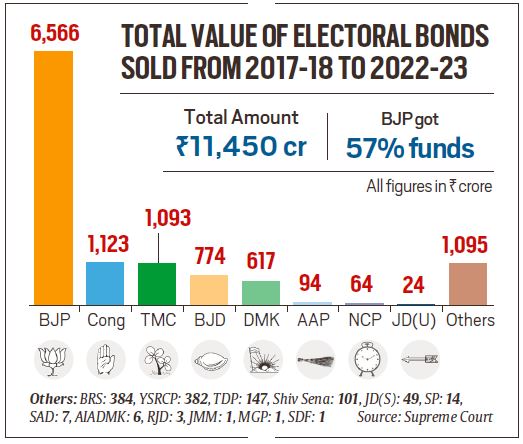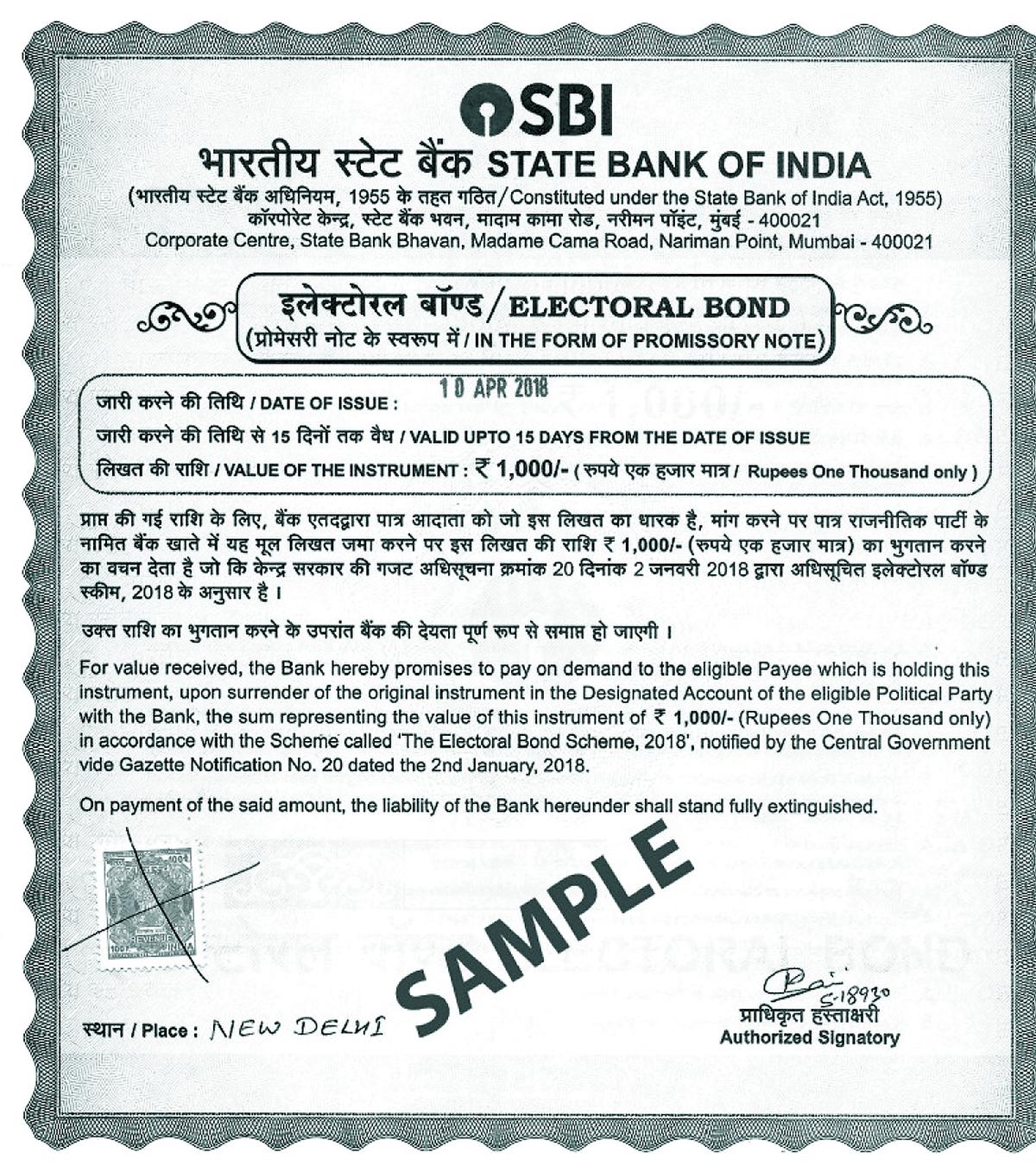"Legal Blow to Electoral Financing: Supreme Court Strikes Down Electoral Bond Scheme"
In a historic decision, the Supreme Court of India has struck down the controversial Electoral Bond Scheme, highlighting that “the information about funding to a political party is essential for a voter to exercise their freedom to vote effectively”, a five-judge Constitution bench, headed by Chief Justice of India. Thus marking a pivotal moment in the nation's ongoing battle for electoral transparency and integrity.
Background of the Electoral Bond Scheme
In recent years, India has witnessed significant reforms in
its electoral financing system, one of the most notable being the introduction
of the Electoral Bond Scheme. Introduced in 2018, this scheme aimed to bring
transparency to political funding by providing a legal channel for donations to
political parties. However, the scheme has been a subject of intense debate,
with proponents hailing it as a step towards cleaner politics while critics
raise concerns about its implications for transparency and accountability.
- The Basics of Electoral Bonds:
Under the Electoral Bond Scheme, individuals and
corporations can purchase bonds from specified branches of authorized banks.
These bonds, available in denominations ranging from ₹1,000 to ₹1 crore or
more, can then be donated to registered political parties. The identity of the
donor remains anonymous, and the recipient's political party can encash the bonds
through designated accounts within a prescribed period.
- Arguments in Favor:
Proponents of the Electoral Bond Scheme argue that it
provides a legal and transparent mechanism for political funding, reducing the
influence of black money and illicit funds in elections. They contend that by
facilitating donations through banking channels, the scheme promotes
accountability and prevents quid pro quo arrangements between political parties
and donors. Additionally, supporters highlight the anonymity provided to
donors, which they argue protects individuals and corporations from potential repercussions
for supporting political causes.
- Criticism and Concerns:
However, the Electoral Bond Scheme has faced significant criticism from various quarters. Critics argue that the anonymity of donors undermines transparency and accountability in political funding, as it makes it impossible for the public to know who is funding political parties. Moreover, concerns have been raised about the potential for misuse of the scheme by foreign entities and corporate interests to influence political decisions without public scrutiny. Critics also point out that the lack of disclosure requirements for political parties receiving electoral bonds erodes public trust in the democratic process.
The Verdict
After extensive deliberations and hearings on the matter, the apex court ruled that the scheme undermined the democratic values of transparency and accountability. The judgment emphasized that voters have the right to be informed about the financial dealings of political parties, which is essential for making informed choices at the ballot box.
In a landmark ruling, the Supreme Court of India declared the Electoral Bond Scheme as violative of Article 19 (1)(a) of the Indian Constitution, which guarantees the fundamental rights to freedom of speech and expression. Article 19 (1)(a) is one of the most crucial components of the Constitution, safeguarding the liberties that form the bedrock of a democratic society. It ensures that every citizen has the right to express themselves freely, without unreasonable constraints.
The court has also directed the SBI, the authorized financial institution under the scheme, to submit by March 6 the details of electoral bonds purchased since April 12, 2019, till date to the Election Commission which will publish the information on its official website by March 13, 2024
“SBI must disclose details of each electoral bond encashed by political parties which shall include the date of encashment and the denomination of the electoral bond,” the SC said
Supreme Court also held that “the deletion of the
proviso to Section 182(1) of the Companies Act, permitting unlimited corporate
funding to political parties is arbitrary and violative of Article 14”
Section 29C of the RPA, as modified by the Finance Act
2017, states that political parties are not obligated to disclose financial
contributions received via electoral bonds. Similarly, Section 13A of the IT
Act, following amendments, exempts political parties from the requirement to
maintain a record of contributions obtained through electoral bonds.
Additionally, the Finance Act 2017 amended Section 182 of the Companies Act
2013, eliminating the prior obligation for companies to disclose details of contributions
made to political parties in their profit and loss accounts. Instead, donors
are only required to disclose the contributed amount without specifying the
recipient political party.
The court rejected the Center's argument that the political party receiving the contribution is unaware of the contributor's identity because the electoral bond does not bear their name, and the bank is unable to disclose such information to the party.
The court contended that while contributors may be de jure anonymous, it does not equate to de facto anonymity. Asserting that the scheme is not infallible, the court highlighted "sufficient gaps" that allow political parties to ascertain the identities and amounts contributed by individuals or entities.
Implications of the Judgment
The striking down of the Electoral Bond Scheme is expected to have far-reaching implications:
Transparency: Political parties will now be required to disclose their sources of funding, ensuring that citizens are aware of who is financially influencing the political agenda.
Accountability: With increased scrutiny of political donations, parties will be held accountable for their financial associations, potentially reducing corrupt practices.
Strengthened Democracy: By ensuring that citizens are well-informed about the financial underpinnings of political parties, the judgment strengthens the democratic fabric of the nation.
- Electoral Reform: This judgment paves the way for further reforms in the electoral financing system, promoting a cleaner and more transparent electoral process.
Reactions to the Decision
The verdict has been met with widespread approval from those advocating for electoral reform. Civil society groups and opposition parties have hailed the decision as a victory for democracy. However, some proponents of the scheme argue that it ensured donations were made through banking channels, thus avoiding cash transactions.
Conclusion
The Supreme Court's decision to strike down the Electoral Bond Scheme as violative of Article 19 is a testament to the judiciary's commitment to uphold the constitutional mandate and is a significant step towards reinforcing the foundations of democracy in India. It reaffirms the judiciary's role as a guardian of constitutional values and sets a precedent for future reforms in electoral finance laws. The focus now shifts to how political parties will adapt to this new era of financial transparency and what additional measures will be taken to further strengthen the democratic process.





Nicely articulated. The proponents of the scheme were trying to make the people believe that an opaque system is 'transparent'!
ReplyDeleteProvides a clear summary about the Electoral Bond Scheme. The verdict strengthens the belief in democracy and Judiciary pillar of the constitution.
ReplyDelete